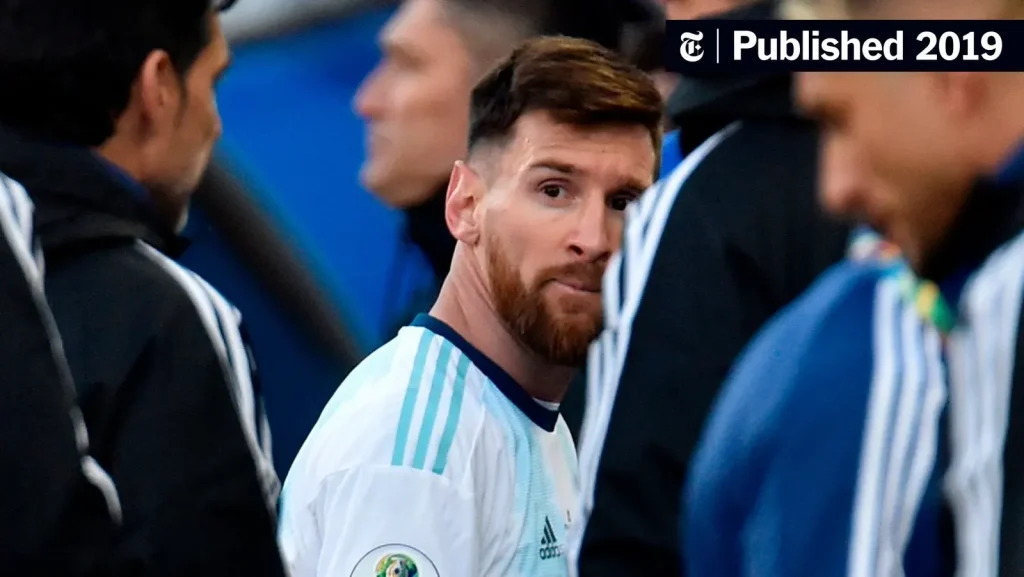The recent Messi suspension criticism has sparked intense debate among soccer fans and critics alike, following Major League Soccer’s controversial decision to suspend Lionel Messi and Jordi Alba for missing the MLS All-Star Game. Both star players, pivotal to Inter Miami’s success, were sidelined for a crucial match against Cincinnati FC after skipping the exhibition event despite being fan favorites. Jorge Mas, the owner of Inter Miami, voiced his frustration, labeling the league’s punishment as “draconian” and questioning the rationale behind such a severe consequence for not participating in a friendly match. Messi, a global soccer icon and captain of the Argentinian World Cup-winning team, cited the need for rest as his reason for absence, a sentiment echoed by Alba due to injury concerns. As the controversy unfolds, many are left wondering how this suspension will affect Messi’s legacy and the future of MLS’s player participation policies.
The debate surrounding Messi’s ban for skipping the exhibition game has ignited substantial discussion within the soccer community. This situation highlights the growing tensions between player commitments and league expectations, particularly in the wake of Lionel Messi’s absence from the All-Star festivities. Jorge Mas’s critique emphasizes the need to reassess policies that can impact star athletes’ availability and their teams’ performance. With professional leagues like MLS striving to balance fan engagement with player welfare, the discourse surrounding this soccer suspension raises important questions about how best to adapt to the evolving landscape of competitive sports. The repercussions of such decisions not only affect individual players but also resonate with the broader audience that passionately follows soccer.
Jorge Mas Critiques MLS for Messi Suspension
Jorge Mas, the owner of Inter Miami, has publicly expressed his discontent regarding Major League Soccer’s decision to suspend Lionel Messi and Jordi Alba for their absence from the All-Star Game. His remarks highlight the tension between player responsibilities and league regulations. Mas has described the suspension as ‘draconian,’ indicating a belief that such a harsh penalty does not justly reflect the circumstances of the players’ absence. He argued that the league fails to comprehend the dynamics involved in players needing rest and recovery during a grueling season.
This situation not only raises questions about the league’s policies but also underscores the complexities surrounding player availability in an increasingly competitive environment. Messi, who plays a pivotal role in Inter Miami’s success, cited the necessity for rest rather than just participation in an exhibition match. Mas’s critique suggests a need for the MLS to reconsider its stance on suspensions, especially when players face tight schedules with multiple games in quick succession.
Impact of Messi’s Absence on Inter Miami’s Performance
The absence of Lionel Messi and Jordi Alba due to the suspension casts a shadow over Inter Miami’s upcoming match against Cincinnati FC, the Eastern Conference leaders. Both players have become integral to the team’s performance, and missing them for such a crucial game could severely impact Inter Miami’s standing in the league. Fans and analysts alike will be keenly watching how the team adapts to their absence and which players step up in this critical time.
As critical fixtures loom, the team’s coach will have to strategize carefully to fill the void left by Messi and Alba. The potential loss of momentum could hinder Inter Miami’s aspirations in the MLS, especially given the pressuring context of competing against top-tier teams. The situation emphasizes the delicate balance teams must maintain between adhering to league regulations and ensuring their star players are effectively managed to compete at their best.
Messi’s Consideration for Rest and Recovery
Lionel Messi’s recent decision to sit out of the MLS All-Star Game reflects a growing recognition of the importance of rest and injury management among professional athletes. With the demands of playing in a new league combined with the physicality of soccer, players like Messi must weigh the benefits of participation in exhibition matches against their overall health and performance capabilities.
This focus on recovery is not unique to Messi; athletes across various sports are increasingly prioritizing their physical well-being in order to maintain peak performance levels throughout lengthy seasons. By opting out of the All-Star Game for the sake of his health, Messi sets a precedent for balancing personal health aspirations and league expectations, ultimately advocating for a more player-centric approach in MLS.
The MLS All-Star Game: A Double-Edged Sword
The MLS All-Star Game serves as a highlight of the soccer calendar, showcasing top talent from within the league against a formidable opponent. While fans eagerly anticipate this annual spectacle, the expectations placed on players to participate can lead to difficult decisions. For Lionel Messi and others who have just returned from injury or simply need rest, skipping the event could result in penalties like suspensions, prompting a serious discussion regarding the value of such exhibition matches.
Moreover, as the league continues to grow in stature, the relevance of the All-Star Game must be weighed against its impact on ongoing league play. The enforcement of strict policies regarding participation might require reevaluation to prioritize the health and career management of star players without undermining the event’s significance during the competitive season.
MLS Commissioner’s Perspective on Messi
MLS Commissioner Don Garber has acknowledged Lionel Messi’s invaluable contributions to the league and the sport in general. His supportive comments about Messi’s commitment to Inter Miami shine a light on the complexity of the situation surrounding the recent suspension. Garber understands the gravity of such decisions and the impact they have on not only the players but also the fans and the league’s image.
While Garber stands by the league’s policy on All-Star participation, he also opens the door for future discussions regarding the rules. This creates an opportunity for a collaborative approach that could lead to a more nuanced understanding of player engagement in such events, enabling the league to adapt policies that consider both player welfare and the appeal of the All-Star match.
Future Discussions on All-Star Game Policies
In light of the controversy surrounding Messi and Alba’s suspension, it is evident that Major League Soccer must confront its existing policies regarding player participation in the All-Star Game. MLS Commissioner Garber has expressed openness to revisiting these policies, suggesting that dialogues with players and club owners could pave the way for more flexible regulations that accommodate the realities of player schedules and recovery needs.
As the league evolves, it is crucial for MLS to strike a balance between maintaining the prestige of the All-Star Game and protecting its star players’ health. Such future discussions can lead to a system that respects both the competitive nature of the league and the well-being of its athletes, ensuring an engaging experience for fans without jeopardizing player health.
Criticism of Draconian Punishments in Soccer
Jorge Mas’s characterization of Messi’s suspension as ‘draconian’ speaks to a larger issue within soccer: the need for proportionality in disciplinary actions. The rigidity of existing rules surrounding player participation requires scrutiny, especially when such harsh penalties can undermine the interests of clubs and fans alike. Considering the high stakes involved in a player’s participation or absence can lead to calls for reform in how leagues enforce regulations.
Furthermore, this situation reflects a growing concern among players and management about overly punitive measures in sports that risk alienating fans and diminishing the excitement of the game. With the increasing commercialization of soccer, stakeholder perspectives—especially those of players and clubs—must converge to promote a more supportive environment that prioritizes the sport’s integrity over rigid rules.
The Role of Players’ Health in Modern Soccer
As soccer becomes more physically demanding, the mental and physical health of players must be prioritized. This issue reflects a transformative shift in the sport, where the awareness of injury prevention and recovery is critical. Lionel Messi’s situation is a case study highlighting the need for soccer leagues to implement more player-friendly policies, allowing athletes to make decisions that prioritize their well-being.
Increasingly, players are encouraged to speak out about their health needs, with clubs and leagues urged to listen. The evolving dialogue emphasizes that performance must not come at the expense of players’ long-term health. Proper management of player schedules, including thoughtful engagement in matches like the All-Star Game, can ensure a robust future for both players and the leagues.
Conclusion: Rethinking League Policies for Player Welfare
In conclusion, the suspension of Lionel Messi and Jordi Alba has prompted a necessary reassessment of the policies surrounding player participation in events such as the MLS All-Star Game. Jorge Mas’s insights provide a valuable perspective on how the league can better align its regulations with the well-being of players, crafting a future where both competitive integrity and athlete welfare are prioritized.
Addressing these challenges will require collaboration between league officials, club management, and players. Ultimately, fostering a culture that values player health and recognizes the nuances of scheduling can lead to a more sustainable and positive environment within MLS. As discussions about future rule modifications progress, the league can enhance the experience for fans while ensuring its stars are protected.
Frequently Asked Questions
What led to Lionel Messi’s suspension criticism from Inter Miami’s owner?
Lionel Messi’s suspension criticism from Inter Miami’s owner, Jorge Mas, stemmed from Major League Soccer’s decision to suspend Messi and Jordi Alba for one game. This was due to their decision to skip the MLS All-Star Game, despite having received sufficient votes to participate. Mas described the suspension as a draconian punishment, questioning the rationale behind penalizing players who skipped an exhibition match.
How did Jorge Mas critique the MLS rules surrounding Messi’s suspension?
Jorge Mas critiqued the MLS rules by labeling Messi’s suspension as unreasonable and draconian. He argued that the league does not understand the context of players needing rest and the decision made by the club for Messi and Alba to miss the All-Star Game, particularly with less than 48 hours between MLS games.
What was the official reason for Messi’s suspension in the MLS?
The official reason for Lionel Messi’s suspension in the MLS was his absence from the All-Star Game without prior approval from the league, which is against the league’s longstanding policy. This rule dictates that any player not participating in the All-Star Game faces a one-game suspension.
How did MLS Commissioner Don Garber respond to Messi’s suspension situation?
MLS Commissioner Don Garber acknowledged Lionel Messi’s contributions to Major League Soccer and sympathized with his situation. He explained that the league had to enforce the existing policy regarding All-Star Game participation, describing the decision to suspend Messi as difficult. Garber also mentioned intentions to review this policy and engage in discussions with players about it.
What impact does Messi’s suspension have on Inter Miami’s performance?
Messi’s suspension significantly impacts Inter Miami’s performance, particularly as he is a key player for the team. Missing the match against Eastern Conference leaders Cincinnati FC could hinder the team’s chances of securing valuable points in the MLS standings.
What are the future implications of Messi’s suspension and the All-Star Game rule?
The future implications of Messi’s suspension may involve revisiting and potentially revising the MLS rules regarding All-Star Game participation. There are indications that MLS plans to initiate discussions with players to adapt the policy, considering the feedback and experiences from current situations like Messi’s.
| Key Point | Details |
|---|---|
| Inter Miami’s Criticism | Jorge Mas criticized MLS for suspending Messi and Alba for skipping the All-Star Game. |
| Reason for Absence | Messi cited the need for rest, while Alba had a prior injury. |
| MLS Suspension Policy | Players who skip the All-Star Game without approval face a one-game suspension. |
| League’s Response | MLS Commissioner Garber acknowledged Messi’s contributions but stated the need to enforce the rules. |
| Future Discussions | Garber mentioned that the league would reconsider the All-Star Game policy going forward. |
Summary
Messi suspension criticism has sparked significant debate among fans and analysts alike. The strong backlash against Major League Soccer highlights the disconnect between league rules and player welfare, particularly in light of the demanding schedules players face. With notable figures like Jorge Mas and Don Garber voicing their opinions, it’s clear that this decision has far-reaching implications for how player participation is managed in the future.



